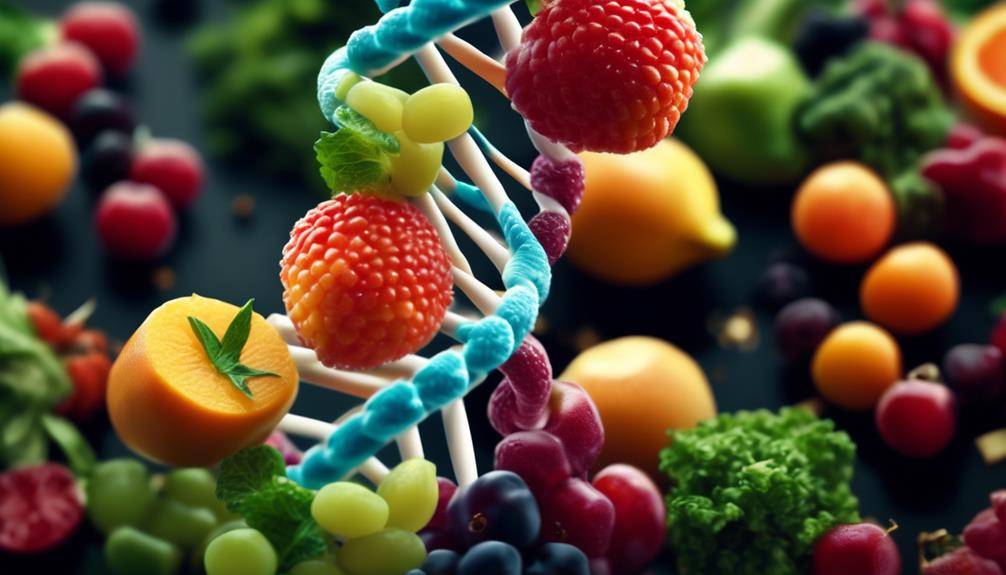Amazing Genomic Advances in Nutritional Food Trends

Genomic Advances in Nutritional Food; Step into the realm of nutritional exploration, where the secrets of your plate unfold like a captivating story waiting to be deciphered. Genomic advances in nutritional food trends have paved the way for a deeper understanding of the intricate relationship between our genes and the foods we consume. With the power of genomics, scientists have unveiled the hidden genetic makeup of our meals, unraveling the potential to unlock personalized dietary plans tailored to our unique genetic profiles. But what does this mean for the future of nutrition? Well, let’s just say that the possibilities are as vast and intriguing as the universe itself.
The Role of Genomics in Nutrition
Genomics plays a crucial role in shaping our understanding of nutrition and its impact on our health. One way genomics influences our diet choices is through the role of genetic testing in nutrition. Genetic testing allows us to gain insights into our individual genetic makeup and how it may affect our response to certain foods and nutrients.
By analyzing our genetic information, we can identify genetic variations that may predispose us to certain nutritional deficiencies or sensitivities. This knowledge can guide us in making more informed dietary choices that are tailored to our specific genetic profile. For example, if someone has a genetic variant that affects their ability to metabolize lactose, they may choose to avoid dairy products or opt for lactose-free alternatives.
Genetic testing can also provide valuable information about our body’s response to macronutrients such as carbohydrates, fats, and proteins. Certain genetic variations may impact how our bodies process these nutrients, which can influence our weight management and risk for chronic diseases. Armed with this knowledge, we can personalize our diet and make adjustments that optimize our nutrition and overall health.
Furthermore, genomics has shed light on the concept of nutrigenomics, which explores how our genes interact with the nutrients we consume. This field of research aims to uncover the specific molecular mechanisms by which nutrients influence gene expression and function. By understanding these interactions, scientists can develop targeted interventions and personalized dietary recommendations for individuals based on their genetic profiles.
Uncovering the Genetic Make-up of Foods
Now, let’s explore the exciting field of uncovering the genetic make-up of foods. Genetic mapping of foods allows scientists to understand the specific genes and genetic variations that contribute to their nutritional composition. This information is then used in nutritional genetics analysis, where researchers can study how these genetic factors influence an individual’s response to different foods and nutrients. By uncovering the genetic make-up of foods, we can gain valuable insights into personalized nutrition and make informed dietary choices based on our unique genetic profiles.
Genetic Mapping of Foods
Scientists have made significant strides in uncovering the genetic make-up of foods through the process of genetic mapping. By utilizing genomic sequencing techniques, researchers are able to identify and analyze the genetic variations present in different food sources. This allows for a better understanding of the molecular composition of various foods, which can have significant implications for nutrition and health.
Genetic mapping provides valuable insights into the genetic factors that contribute to the taste, texture, and nutritional content of foods. Furthermore, it allows scientists to identify potential allergens or toxins that may be present in certain food varieties. This information can be used to develop personalized diets, improve food safety measures, and enhance breeding programs to produce more nutritious and sustainable food options. Genetic mapping of foods is a powerful tool that holds great promise for the future of nutrition and agriculture.
Nutritional Genetics Analysis
Uncovering the genetic make-up of foods through nutritional genetics analysis provides valuable insights into their molecular composition and potential health implications. Nutritional genetics testing allows us to identify genetic variations in nutrient metabolism, which can help us understand how different individuals process and utilize nutrients. By analyzing the genetic variations related to nutrient metabolism, we can gain a better understanding of how our bodies respond to specific foods and nutrients.
This information can be used to tailor personalized dietary recommendations and interventions for individuals based on their genetic profile. Nutritional genetics analysis allows us to move away from a one-size-fits-all approach to nutrition and instead focus on personalized nutrition strategies that take into account an individual’s unique genetic makeup. This can lead to improved health outcomes and better management of chronic diseases through targeted nutrition interventions.
Understanding the Nutrigenomic Relationship
What is the relationship between nutrition and genomics, and how does it impact our health and well-being? Understanding the nutrigenomic relationship is essential for optimizing our diet and overall health. Nutrigenomics is the study of how our genes interact with the foods we eat and how these interactions influence our health outcomes. By analyzing our genetic makeup through nutrigenomic testing, we can gain valuable insights into our unique gene-diet interactions and make informed choices about our diet and lifestyle.
Here are four key ways in which understanding the nutrigenomic relationship can positively impact our health and well-being:
- Personalized Nutrition: Nutrigenomic testing allows us to understand how our genes influence our response to different nutrients. By identifying gene variants that affect our metabolism, absorption, and utilization of specific nutrients, we can tailor our diet to meet our individual needs. This personalized approach can optimize nutrient intake, improve digestion, and support overall well-being.
- Disease Prevention: Certain gene variants can increase our susceptibility to certain diseases, while others can offer protection. By understanding our genetic predispositions through nutrigenomic testing, we can make proactive lifestyle choices and dietary modifications that can help prevent or manage these conditions. This empowers us to take charge of our health and reduce the risk of developing chronic diseases.
- Weight Management: Our genetic makeup plays a significant role in determining how our bodies respond to different diets and exercise regimens. Nutrigenomic testing can identify gene variants associated with metabolism, appetite regulation, and nutrient utilization. Armed with this knowledge, we can tailor our diet and exercise plans to optimize weight management and achieve our health goals more effectively.
- Optimal Nutrient Utilization: Nutrigenomic testing can identify genetic variations that affect how our bodies process and utilize specific nutrients. This knowledge can help us understand potential deficiencies or imbalances and guide us in making targeted dietary choices or considering appropriate supplementation. By optimizing nutrient utilization, we can support our overall health and well-being.
Understanding the nutrigenomic relationship through gene-diet interactions and nutrigenomic testing empowers us to make informed decisions about our diet, lifestyle, and overall health. By personalizing our nutrition, preventing diseases, managing our weight, and optimizing nutrient utilization, we can improve our well-being and enhance our quality of life.
Personalized Dietary Plans Based on Genetic Profiles
Personalized dietary plans based on genetic profiles can optimize nutrient intake and support overall well-being by tailoring the diet to individual genetic needs. Genetic testing for dietary planning has emerged as a promising tool in the field of personalized nutrition recommendations. By analyzing an individual’s genetic profile, it is possible to gain insights into their unique nutritional requirements and tailor their diet accordingly.
Genetic testing for dietary planning involves analyzing specific genes that play a role in metabolism, nutrient absorption, and the risk of developing certain health conditions. This information can then be used to create personalized nutrition recommendations that take into account an individual’s genetic predispositions.
For example, individuals with a genetic variant that affects their ability to metabolize certain nutrients may require higher or lower intake of those nutrients compared to the general population. Similarly, genetic variations that affect nutrient absorption may require adjustments in the type or form of nutrients consumed.
By understanding an individual’s genetic profile, personalized dietary plans can be designed to optimize nutrient intake and address potential deficiencies or imbalances. This approach has the potential to enhance overall health and well-being by supporting optimal nutrient utilization and reducing the risk of nutritional deficiencies or chronic diseases.
It is important to note that genetic testing for dietary planning is still a relatively new field and more research is needed to fully understand the relationship between genetics and nutrition. Additionally, personalized dietary plans should be implemented in conjunction with guidance from healthcare professionals, such as registered dietitians or nutritionists, who can provide expert advice and support.
Harnessing Genomic Data for Optimal Nutrition
To optimize your nutrition and make informed dietary choices, harnessing genomic data can provide valuable insights into your individual nutritional needs and requirements. With advancements in genetic research, scientists have identified specific genetic markers that can be used to tailor personalized diets. By analyzing your genomic data, experts can determine how your body processes and metabolizes different nutrients, allowing them to create a diet plan that is optimized for your genetic makeup. Here are four ways in which harnessing genomic data for personalized diets can benefit you:
- Enhanced Nutrient Absorption: Genetic markers can reveal how efficiently your body absorbs certain vitamins and minerals. This knowledge can help identify any deficiencies you may have and guide you towards foods that are rich in the nutrients your body needs most.
- Optimized Macronutrient Ratios: Genomic data can shed light on how your body responds to different macronutrients, such as carbohydrates, proteins, and fats. This information can be used to create a personalized diet plan that emphasizes the macronutrients your body metabolizes most effectively.
- Tailored Food Sensitivities: Genetic markers can also provide insights into your body’s sensitivity to certain foods. By identifying specific sensitivities, you can avoid triggering foods and make choices that promote optimal digestion and overall well-being.
- Optimal Weight Management: Genetic markers can play a role in determining your predisposition to certain weight-related factors, such as appetite regulation and fat metabolism. By understanding your genetic profile, experts can provide personalized recommendations to support healthy weight management.
Harnessing genomic data for personalized diets is revolutionizing the way we approach nutrition. By leveraging the power of genetic information, individuals can make dietary choices that are tailored to their unique needs, promoting optimal health and well-being.
Genomic Advances in Nutritional Research
Advancements in genomic research are revolutionizing the field of nutritional research, providing valuable insights into the intricate relationship between genetics and nutrition. One of the most promising applications of genomic research in nutrition is the use of genomic testing for personalized nutrition. By analyzing an individual’s genetic makeup, researchers can identify specific genetic variations that impact nutrient metabolism.
Genomic testing for personalized nutrition involves analyzing an individual’s DNA to identify genetic variations that affect how their body processes and utilizes nutrients. This information can then be used to develop personalized dietary recommendations tailored to an individual’s unique genetic profile. For example, someone with a genetic variation that affects their ability to metabolize certain nutrients may benefit from consuming higher levels of those nutrients or taking supplements to compensate for the deficiency.
Understanding genetic variations in nutrient metabolism is crucial for optimizing individual health outcomes. For instance, certain genetic variations can impact how efficiently your body absorbs and uses important vitamins and minerals. By identifying these variations, researchers can develop targeted interventions to ensure individuals with specific genetic profiles receive the nutrients they need to maintain optimal health.
Genomic advances in nutritional research also provide insights into how genetics influence dietary preferences and food choices. Genetic variations can affect taste and sensory perception, which can influence an individual’s food preferences and eating behavior. By understanding these genetic factors, researchers can develop strategies to promote healthier eating habits and improve adherence to dietary recommendations.
Implications for Personalized Nutrition
Understanding the implications of genomic advances in nutritional research can have a significant impact on optimizing your personalized nutrition. With the advent of genetic testing for nutrition, it is now possible to tailor your diet to your unique genetic makeup. Here are four reasons why personalized meal plans based on genetic testing can revolutionize your approach to nutrition:
- Improved Nutrient Absorption: Genetic testing can reveal specific variations in your genes that affect how your body absorbs and utilizes nutrients. By identifying these variations, personalized meal plans can be created to ensure you are getting the right balance of nutrients that your body needs for optimal health.
- Optimized Weight Management: Genetic testing can also provide insight into your genetic predisposition for certain traits, such as your metabolism and response to different types of diets. This information can be used to develop personalized meal plans that are tailored to your specific genetic profile, helping you achieve and maintain your ideal weight more effectively.
- Reduced Risk of Chronic Diseases: Certain genetic variations can increase your risk of developing chronic diseases such as heart disease, diabetes, and certain types of cancer. Genetic testing can identify these variations, allowing for the creation of personalized meal plans that focus on reducing your risk factors and promoting overall health and longevity.
- Enhanced Athletic Performance: Genetic testing can uncover specific genetic variations that may impact your athletic performance and response to exercise. By understanding your genetic predispositions, personalized meal plans can be developed to optimize your nutrient intake and support your athletic goals, whether it be endurance, strength, or speed.
The Future of Nutritional Food Trends
As we look ahead to the future of nutritional food trends, there are exciting possibilities on the horizon that have the potential to transform the way we approach our diets. One area that holds great promise is the future of personalized nutrition, which involves exploring genetic variations in dietary preferences.
Advancements in genomic research have allowed scientists to identify specific genetic variations that can influence our response to different types of food. These variations can affect how our bodies process nutrients, metabolize certain substances, and even impact our taste preferences. By understanding these genetic variations, researchers can develop personalized nutrition plans that are tailored to an individual’s unique genetic makeup.
Imagine a future where you can undergo a simple genetic test that identifies your specific genetic variations related to dietary preferences. Armed with this information, you can make more informed choices about the types of food that are best suited to your genetic profile. For example, if you have a genetic variation that affects your ability to process certain nutrients, you can adjust your diet accordingly to ensure you meet your nutritional needs.
This personalized approach to nutrition has the potential to revolutionize the way we eat. Rather than following generic dietary guidelines, we can now have personalized recommendations that take into account our individual genetic variations. This could lead to improved health outcomes and a better understanding of how our bodies respond to different foods.
While the future of personalized nutrition is still unfolding, the possibilities are truly exciting. By exploring genetic variations in dietary preferences, we can unlock a new level of understanding about how our bodies interact with food. This knowledge has the potential to transform the way we approach our diets, ultimately leading to better health and well-being for all.
Genomic Advances in Nutritional Food; Frequently Asked Questions
How Does Genomics Contribute to the Development of Personalized Dietary Plans Based on Genetic Profiles?
Genomics contributes to personalized nutrition by analyzing genetic profiles. This helps create dietary plans tailored to individual needs, considering factors like metabolism and nutrient absorption. It enables you to optimize your health and well-being through targeted dietary choices.
What Are the Potential Implications of Genomics for Personalized Nutrition?
Genomic advances have potential applications for personalized nutrition, allowing for tailored dietary plans based on genetic profiles. However, ethical considerations must be addressed to ensure privacy, consent, and equitable access to these technologies.
How Does Understanding the Genetic Make-Up of Foods Contribute to Nutritional Research?
Understanding the genetic make-up of foods through genetic modification and nutrigenomics contributes to nutritional research by providing insight into the specific health benefits and potential risks associated with different food components.
What Are Some Examples of Genomic Advances in Nutritional Research?
Genomic advances in nutritional research, such as genomic sequencing and nutrigenomics research, have revolutionized our understanding of how genetics influence food and nutrition. These advances provide valuable insights into personalized nutrition and dietary recommendations.
How Can Harnessing Genomic Data Contribute to Optimal Nutrition?
Harnessing genomic data for precision nutrition allows for personalized diets based on individual genetic makeup. By analyzing genomic data, researchers can identify specific nutrient needs and tailor dietary recommendations to optimize nutrition and overall health.
Conclusion
In conclusion, the genomic advances in nutritional food trends have provided a deeper understanding of the role of genetics in nutrition. By uncovering the genetic make-up of foods and understanding the nutrigenomic relationship, personalized dietary plans based on genetic profiles can be developed. Harnessing genomic data can lead to optimal nutrition and improved health outcomes. These advancements have significant implications for personalized nutrition and offer a promising future for the field of nutritional food trends.








